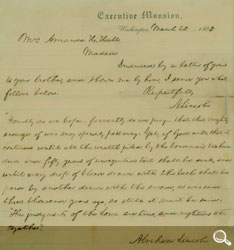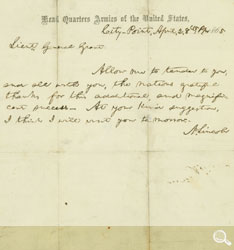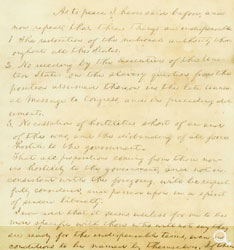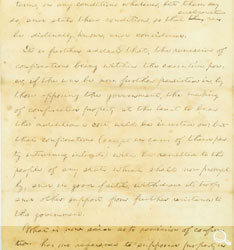

"That this mighty scourge of war may speedily pass away"
Military victories on the battlefield secured the Union and black freedom. By 1865, victory was near. Lincoln urged secretary of war Edwin Stanton to provide General William T. Sherman with support "now that the enemy is wavering…." When Lincoln received word from General Ulysses S. Grant that Petersburg and Richmond, Virginia, were about to surrender, he joyfully declared, "Allow me to tender to you, and all with you, the nations grateful thanks for this additional, and magnificent success."
William Tecumseh Sherman (1820–1891) is best known for his “march to the sea” that created a path of destruction from Atlanta to Savannah, Georgia. Sherman offered the surrender of Savannah to Lincoln as a Christmas present on December 22, 1864. Photograph courtesy of Library of Congress.
Abraham Lincoln was the first president since Andrew Jackson in 1832 to be elected to a second term. Alexander Gardner photographed Lincoln as he delivered what is regarded as the most eloquent and concise statement of slavery as the underlying cause of the war. Photograph courtesy of the Abraham Lincoln Presidential Library and Museum.
In his second inaugural address on March 4, 1865, Lincoln delivered the most profound explanation of the war’s meaning: "Fondly do we hope—fervently do we pray—that this mighty scourge of war may speedily pass away. Yet, if God wills that it continue until all the wealth piled by the bondman’s two hundred and fifty years of unrequited toil shall be sunk, and until every drop of blood drawn with the lash shall be paid by another drawn with the sword, as was said three thousand years ago, so still it must be said: 'The judgments of the Lord are true, and righteous altogether.'"
Abraham Lincoln to Amanda Hall, March 20, 1865
Abraham Lincoln to Amanda Hall, March 20, 1865. On loan from the Abraham Lincoln Presidential Library and Museum.
Answering a request for a portion of his inaugural address, Lincoln provides the most powerful and moving section.
Download text transcript of document (.pdf)
Abraham Lincoln to General Ulysses S. Grant, April 2, 1865
Abraham Lincoln to General Ulysses S. Grant, April 2, 1865. On loan from the Abraham Lincoln Presidential Library and Museum.
Lincoln had been invited by Grant to City Point, Virginia, to witness the end of the war. Two days later, on April 4, Lincoln walked through the streets of Richmond escorted by ten sailors. Throngs of blacks greeted Lincoln, with one woman declaring, "I know I am free for I have seen Father Abraham and felt him."
Download text transcript of document (.pdf)
Abraham Lincoln to John Campbell, April 5, 1865
Lincoln's terms for peace were simple and direct. The question of a brokered peace became moot four days later on April 9 when General Robert E. Lee surrendered to General Ulysses S. Grant at Appomattox Court House, Virginia.
Download text transcript of document (.pdf)
Page 1: Abraham Lincoln to John Campbell, April 5, 1865. On loan from the Abraham Lincoln Presidential Library and Museum.





